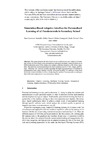Mostrar el registro sencillo del ítem
Simulation-Based Adaptive Interface for Personalized Learning of AI Fundamentals in Secondary School
| dc.contributor.author | Guerreiro-Santalla, Sara | |
| dc.contributor.author | Duraes, Dalila A | |
| dc.contributor.author | Crompton, Helen | |
| dc.contributor.author | Novais, Paulo | |
| dc.contributor.author | Bellas, Francisco | |
| dc.date.accessioned | 2024-01-17T16:01:02Z | |
| dc.date.issued | 2023-12-15 | |
| dc.identifier.citation | Guerreiro-Santalla, S., Duraes, D., Crompton, H., Novais, P., Bellas, F. (2023). Simulation-Based Adaptive Interface for Personalized Learning of AI Fundamentals in Secondary School. In: Moniz, N., Vale, Z., Cascalho, J., Silva, C., Sebastião, R. (eds) Progress in Artificial Intelligence. EPIA 2023. Lecture Notes in Computer Science(), vol 14115. Springer, Cham. https://doi.org/10.1007/978-3-031-49008-8_1 | es_ES |
| dc.identifier.isbn | 978-3-031-49007-1 | |
| dc.identifier.uri | http://hdl.handle.net/2183/34954 | |
| dc.description | This version of the conference paper has been accepted for publication, and is subject to Springer Nature’s AM terms of use, but is not the Version of Record and does not reflect post-acceptance improvements, or any corrections. The Version of Record is available online at: http:// dx.doi.org/10.1007/978-3-031-49008-8_1 | es_ES |
| dc.description.abstract | [Abstract]: This paper presents the first results on the validation of a new Adaptive E-learning System, focused on providing personalized learning to secondary school students in the field of education about AI by means of an adaptive interface based on a 3D robotic simulator. The prototype tool presented here has been tested at schools in USA, Spain, and Portugal, obtaining very valuable insights regarding the high engagement level of students in programming tasks when dealing with the simulated interface. In addition, it has been shown the system reliability in terms of adjusting the students’ learning paths according to their skills and competences in an autonomous fashion. | es_ES |
| dc.description.sponsorship | The work of D. Durães and P. Novais has been supported by FCT–Fundação para a Ciência e Tecnologia within the R&D Units Project Scope: UIDB/00319/2020. The work of F. Bellas was supported by Grant TED2021-131172B-I00 funded by MCIN/AEI/ 10.13039/501100011033 and by the “European Union NextGenerationEU/ PRTR”. The "Programa de ayudas a la etapa predoctoral" from Xunta de Galicia supported this work through Sara Guerreiro´s grant. Finally, F. Bellas and S. Guerreiro- Santalla wish to acknowledge the CITIC research center, funded by Xunta de Galicia and European Regional Development Fund (grant ED431G 2019/01). | es_ES |
| dc.description.sponsorship | Portugal. Fundação para a Ciência e Tecnologia; UIDB/00319/2020 | es_ES |
| dc.description.sponsorship | Xunta de Galicia; ED431G 2019/01 | es_ES |
| dc.language.iso | eng | es_ES |
| dc.publisher | Springer | es_ES |
| dc.relation | info:eu-repo/grantAgreement/MICINN/Plan Estatal de Investigación Científica y Técnica y de Innovación 2021-2023/ TED2021-131172B-I00/ES | es_ES |
| dc.relation.uri | https://doi.org/10.1007/978-3-031-49008-8_1 | es_ES |
| dc.rights | Springer Nature’s AM terms of use https://www.springernature.com/gp/open-research/policies/accepted-manuscript-terms | es_ES |
| dc.subject | Adaptive e-learning | es_ES |
| dc.subject | Intelligent tutoring system | es_ES |
| dc.subject | Personalized learning | es_ES |
| dc.subject | Adaptive interfaces | es_ES |
| dc.subject | AI education | es_ES |
| dc.subject | Robot simulation | es_ES |
| dc.title | Simulation-Based Adaptive Interface for Personalized Learning of AI Fundamentals in Secondary School | es_ES |
| dc.type | info:eu-repo/semantics/conferenceObject | es_ES |
| dc.rights.access | info:eu-repo/semantics/embargoedAccess | es_ES |
| dc.date.embargoEndDate | 2024-12-15 | es_ES |
| dc.date.embargoLift | 2024-12-15 | |
| dc.identifier.doi | https://doi.org/10.1007/978-3-031-49008-8_1 | |
| UDC.conferenceTitle | EPIA 2023. Progress in Artificial Intelligence | es_ES |






